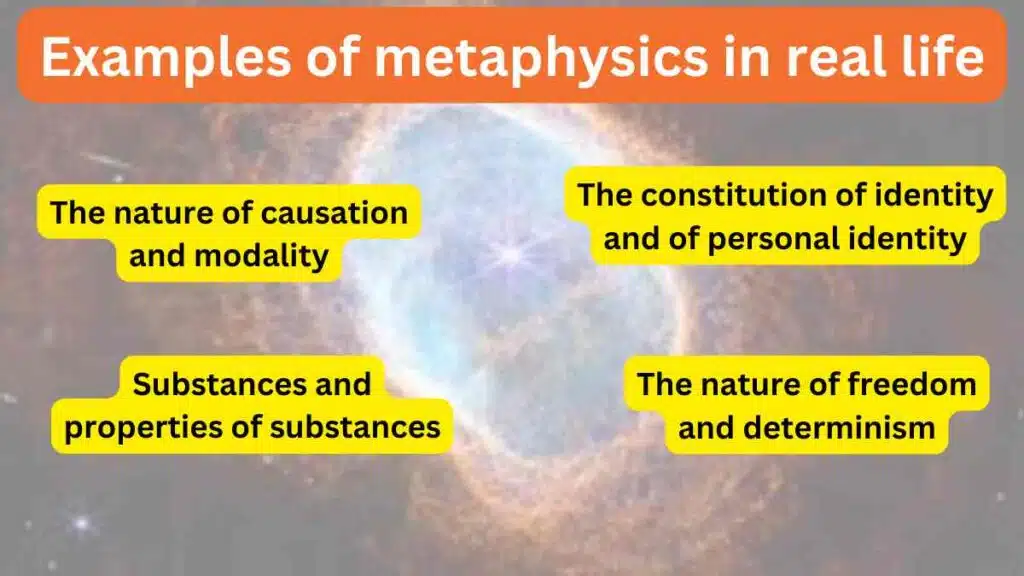Examples of metaphysics in real life
What is metaphysics?
Metaphysics is a branch of philosophy that studies the nature of reality, existence, and the universe beyond physical observation. It asks deep questions about what is real, what exists, and how everything is connected. The metaphysics meaning comes from the Greek words “meta” (beyond) and “physika” (physical), meaning it goes beyond the physical world.
Metaphysics definition and examples often include topics like time, space, identity, cause and effect, and the relationship between mind and body. Some common metaphysics examples include asking if we have free will, if the universe has a purpose, or if time is an illusion. Other examples of metaphysics in real life involve pondering the existence of God, the soul, or what happens after death.
A simple example of metaphysics is thinking about whether the world we see is truly real or just a mental perception. These kinds of questions are central to metaphysics philosophy and continue to shape how we understand the world and ourselves.

Examples of metaphysics in real life
Here are some examples of metaphysics in real life, including the nature of causation and modality, substances and properties of substances, the mind-body problem, the nature of freedom and determinism, and the constitution of identity and of personal identity:
The nature of causation and modality
Metaphysics is concerned with the question of what causation is and how it works. This question has important implications for our understanding of the physical world, as well as our moral and legal systems.
For example, if we believe that causation is deterministic, then we believe that every event has a single cause and that there is no such thing as chance. This would mean that we could predict the future with perfect accuracy if we had enough information.
However, if we believe that causation is indeterministic, then we believe that there is some element of chance in the universe. This would mean that we can never predict the future with perfect accuracy.
Substances and properties of substances
Metaphysics asks what substances are and what properties they have. This question is relevant to our understanding of the physical world, as well as our understanding of ourselves.
For example, if we believe that substances are made up of atoms, then we believe that everything in the universe is ultimately made up of tiny, indivisible particles. However, if we believe that substances are not made up of atoms, then we believe that there is something more fundamental to reality than matter.
The mind-body problem
Metaphysics is concerned with the question of how something physical, such as the brain, can relate to something mental, such as the mind. This question has been debated for centuries and has important implications for our understanding of consciousness, free will, and the nature of reality.
For example, if we believe that the mind is simply a product of the brain, then we believe that consciousness is an illusion. However, if we believe that the mind is something more than the brain, then we believe that consciousness is a real and fundamental part of reality.
The nature of freedom and determinism
Metaphysics is concerned with the question of whether human beings have free will or whether our actions are determined by factors beyond our control. This question has important implications for our understanding of morality, responsibility, and the law.
For example, if we believe that human beings have free will, then we believe that they are responsible for their actions. This means that they should be held accountable for their crimes and wrongdoings.
However, if we believe that human beings are determined by factors beyond their control, then we cannot hold them accountable for their actions. This could lead to a more lenient approach to crime and punishment.
The constitution of identity and of personal identity
Metaphysics asks what makes something the same thing over time. This question is relevant to our understanding of personal identity, as well as our understanding of objects in the physical world.
For example, if we believe that something is the same thing over time if it has the same physical properties, then we believe that a person is the same person over time if they have the same body.
However, if we believe that something is the same thing over time if it has the same mental properties, then we believe that a person is the same person over time if they have the same memories and personality.



Leave a Reply